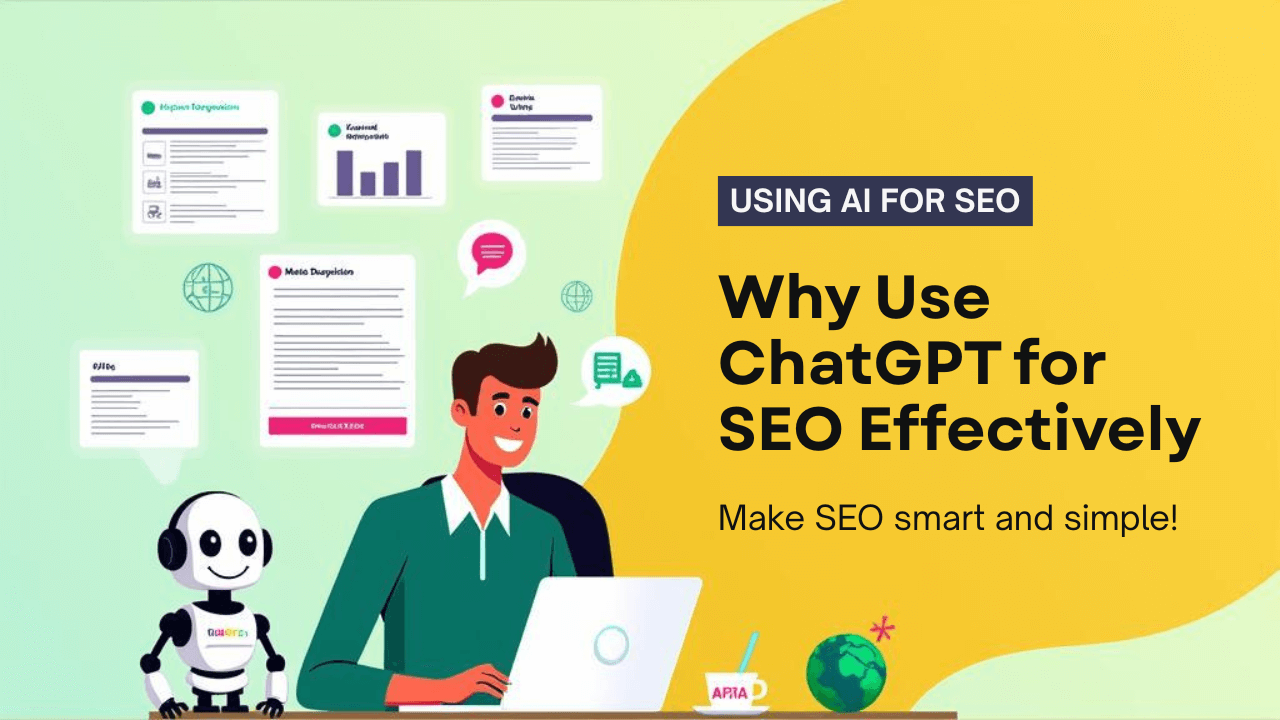Keyword stuffing in text is no longer the main focus of search engine optimisation, or SEO.. In 2025, SEO is a comprehensive digital strategy that includes content quality, user experience, technical performance, and authority. One powerful tool that has emerged in recent years is ChatGPT by OpenAI. When used correctly, ChatGPT for SEO can help marketers, business owners, and bloggers optimize their content, streamline SEO tasks, and dominate search rankings. In this extensive guide, we’ll break down exactly how to use ChatGPT for SEO, supported by real-world examples, prompts, and actionable tips.
1.What is ChatGPT, And ChatGPT for SEO

OpenAI created ChatGPT, an Advanced conversational AI that can comprehend and produce natural language. It is trained on large datasets, which enables it to understand context, answer questions, write articles, and even code. ChatGPT for SEO refers to using this AI model to help with SEO-related tasks—from generating keyword ideas to writing optimized blog posts.ChatGPT allows you to write, discuss, and get responses to any queries you might have.That’s ChatGPT.It’s a computer program made by a company called OpenAI. ChatGPT is trained on tons of information from books, websites, and conversations, which helps it understand what you’re asking and give smart, helpful answers.
Now let’s talk about ChatGPT for SEO
SEO means “Search Engine Optimization.” It’s the process of improving your website so it shows up higher on Google when people search for something. For example, if someone types “best shoes for running” in Google, SEO helps decide which websites show up first.
This is where ChatGPT becomes very helpful. ChatGPT for SEO means using ChatGPT to help you with tasks that make your website better for Google. Let’s say you want to write a blog but don’t know which topic to choose or what words to include so it ranks on Google. You can ask ChatGPT things like:
- “Give me blog topic ideas for fitness.”
- “What are good SEO keywords for travel?”
- “Write an SEO-friendly blog post on healthy eating.”
ChatGPT can help you
- Find the right keywords
- Write catchy titles and meta descriptions
- Create full blog posts with proper structure
- Make your content easier to read and understand
- Even check if your writing is SEO-optimized or not
So, using ChatGPT for SEO is like having a digital assistant who never gets tired, always gives new ideas, and helps you improve your website so more people can find you online.
In short, if you’re a blogger, student, business owner, or beginner in digital marketing, ChatGPT can make SEO simple, fast, and fun to learn.
2.Why Use ChatGPT for SEO

Doing SEO can sometimes feel like a lot of hard work. You have to search for the right words (called keywords), write long articles, make small descriptions, and think a lot about what to write next. It can take a lot of time and feel boring too.
But don’t worry — ChatGPT for SEO makes all of this much easier!
Just like a smart helper, ChatGPT can:
- Find good keywords for your topic
- Help you write blog articles in less time
- Create short SEO meta descriptions (the small text you see on Google)
- Make outlines to organize your blog
- Give you questions and answers for your FAQ section
- Even translate your content into other languages
Let’s understand with a real example:
A self-employed digital marketer from Jammu and Kashmir wrote material using ChatGPT for SEO. He wanted to write a long article using the keyword “ChatGPT for SEO.” So, he asked ChatGPT to help him. The AI suggested catchy headings, wrote about 2,000 words, and even gave ideas that people are searching on Google right now.
This saved him a lot of time and helped him make a better blog.
So remember, ChatGPT for SEO is like your smart friend who helps with your work, gives you ideas, and makes SEO easy and fun!
3.Keyword Research with ChatGPT (with Examples)

There are some tools like Ubersuggest and Ahrefs. These tools show numbers — like how many people search a word, and how hard it is to rank for it. But they don’t give you creative ideas.
That’s where ChatGPT for SEO becomes super helpful.
If you don’t know what to write or which keywords to target, you can just ask ChatGPT! For example, you can say:
- “Give me 20 long keywords about ChatGPT for SEO that are easy to rank.”
ChatGPT will quickly give you smart keyword ideas like:
- How to use ChatGPT for SEO in 2025
- Best ChatGPT SEO prompts
- ChatGPT for technical SEO
- Is ChatGPT good for SEO beginners?
- Local SEO with ChatGPT
These are called long-tail keywords, and they’re great for getting more traffic to your blog or website.
After getting these ideas, you can double-check them using tools like Google Keyword Planner or SEMrush. That way, you’ll know which ones are really good.
Smart Tip: You can even ask ChatGPT to group your keywords. For example:
- Which ones are just for learning? (informational)
- Which ones are for taking action or buying? (transactional)
- Which ones are for finding something specific? (navigational)
So, with ChatGPT for SEO, not only do you save time — you also get smart ideas that help you write better, rank faster, and reach more people online.
4.Content Creation Using ChatGPT for SEO
Once you have found your keywords, the next big step is to create content. This means writing blog posts, website pages, product descriptions — anything that people can read and Google can rank.
Now, writing good content takes time and ideas. But here’s the good news — with ChatGPT for SEO, this becomes much easier!
Let’s understand with an example.
You can simply give ChatGPT a clear prompt like:
- “Write a 200-word introduction for a blog post titled ‘ChatGPT for SEO in 2025’ using the focus keyword.”
ChatGPT will quickly give you something like this:
“In today’s fast-changing world of digital marketing, ChatGPT for SEO is a powerful tool. Whether you’re a beginner or an expert, using ChatGPT helps you create content that is smart, helpful, and easy to read. It saves time and helps your content rank better on Google. In 2025, ChatGPT for SEO is becoming the go-to choice for marketers who want fast, high-quality results.”
You can always make small changes to match your tone, but the main structure and idea are already done — within seconds!
This shows how ChatGPT for SEO can help you go from just having ideas… to creating full content that actually works online. You don’t need to be a professional writer — just give a clear instruction, and ChatGPT handles the rest.
5.On-Page SEO Optimization
ChatGPT is not just for writing blogs — it can also help improve small but important parts of your website content. These small parts matter a lot in SEO.
With ChatGPT for SEO, you can make things better like:
- Title tags (the name of your page that shows on Google)
- H1 to H6 tags (the headings in your blog or article)
- Where and how to use your keywords
- Making anchor texts for linking between your website pages
You can simply give a prompt to ChatGPT, like:
- “Rewrite this paragraph to include the keyword ‘ChatGPT for SEO’ naturally and make it easier to read.”
Before:
- “AI tools are helpful in modern marketing.”
After (by ChatGPT):
- “ChatGPT for SEO is changing how marketers do digital work by making content writing and SEO easier.”
As you can see, the new sentence is more clear, more useful, and has the keyword placed in a natural way.
So, when you’re doing on-page SEO, ChatGPT for SEO becomes your little helper — it fixes headings, adds keywords in the right spots, and makes your writing better for both people and Google.
6.Content Outline and Planning
Before you start writing a blog, it’s very important to plan what you’re going to write. Just like we make a rough sketch before drawing, we need an outline before writing a blog.
ChatGPT for SEO can be very beneficial in this situation.
Instead of sitting for hours and thinking “What should I write next?”, You can ask ChatGPT to create a comprehensive outline for you.. That means it will tell you what headings to use, what topics to cover, and in which order.
For example, you can type this prompt:
- “Create a detailed outline for a blog on ‘ChatGPT for SEO’ with at least 10 H2 subheadings.”
And ChatGPT might give you something like this:
- Introduction
- What is SEO and Why It Matters
- Benefits of Using AI in SEO
- How ChatGPT Helps in Keyword Research
- Creating Meta Descriptions with ChatGPT
- Using ChatGPT for E-E-A-T Friendly Content
- ChatGPT for Multilingual SEO (Multiple Languages)
- Best ChatGPT Prompts for SEO Tasks
- Real-Life Examples of ChatGPT for SEO
- Conclusion + Final Tips
Now imagine — instead of guessing what to write, you already have a ready-made plan in front of you. You just have to write under each heading.
This is the magic of ChatGPT for SEO. It saves time, gives you better structure, and helps you focus only on writing — not worrying about what comes next.
So next time, before writing any SEO blog, let ChatGPT for SEO build a smart outline for you. It’s like having your personal planner for every article!
7. SEO Meta Tags and Descriptions
Writing a good blog is not enough — you also need to write a meta description. This is the small sentence that shows under your blog link on Google. It tells people what your blog is about and helps them decide whether to click or not.
Now, thinking of short and catchy meta descriptions can be tricky. But here’s where ChatGPT for SEO comes in handy again!
You can just ask ChatGPT with a simple prompt like:
Prompt:
- “Write 3 meta descriptions under 160 characters for a blog titled ‘ChatGPT for SEO: The Ultimate Guide.’”
ChatGPT will provide you with alternatives that are easy to understand and appealing, such as:
- This thorough 2025 tutorial will teach you how to use ChatGPT for SEO. Learn how to rank higher, faster.”
- “Use ChatGPT for SEO like a pro. Keywords, blogs, meta – all in one guide.”
- “Boost traffic in 2025 using ChatGPT for SEO. SEO strategies for real-world success.”
These descriptions are short (under 160 characters), include the main keyword, and are written in a way that grabs attention.
So instead of writing boring or confusing meta texts, you can use ChatGPT for SEO to make them smart, clear, and perfect for Google — in just seconds!
8.Content Refreshing and Updating
You can’t write SEO content once and then forget about it. Just like mobile apps get updates, your blogs and website content also need updates over time.
That’s because things keep changing — new tools come, Google updates its rules, and the way people search also changes.
So if you wrote a blog in 2022, it might be outdated now in 2025. That’s why ChatGPT for SEO can help you refresh and improve your old content quickly.
You can simply ask:
Prompt:
- “Suggest 3 updates for a 2022 blog on ‘ChatGPT and SEO.’”
ChatGPT might give smart ideas like:
- Update old statistics with new 2025 data about how AI is used in SEO.
- Add information about new tools that now work with ChatGPT for SEO.
- Include the latest Google rules and tips for using AI-generated content.
These updates make your blog look fresh, useful, and up-to-date — which Google and your readers both love!
So whenever you feel your blog is getting old, just use ChatGPT for SEO to quickly find what needs to change. It keeps your content at the top and saves time.
9. ChatGPT Prompts for SEO Tasks
Prompts are like questions or instructions you give to ChatGPT. The better your prompt, the better the answer you’ll get. So, knowing how to write a good prompt is very important.
When you’re using ChatGPT for SEO, prompts help you get exactly what you need — whether it’s keywords, content, FAQs, or blog ideas.
Think of prompts like giving directions. If you tell ChatGPT clearly what you want, it will give you a perfect answer in seconds.
Here are some simple and useful prompts you can try:
- “List 5 schema markups relevant for a service page.”
- “Compose a 300-word frequently asked question section on using ChatGPT for SEO.”
- “What ten blog article titles use the keyword ‘ChatGPT for SEO’ to target?”
These kinds of prompts help you do big SEO tasks faster — without needing to be an expert.
So, whether you’re writing a blog, updating a website, or creating FAQs, using the right prompt with ChatGPT for SEO makes your work easier, faster, and smarter.
10. Technical SEO and ChatGPT
Even though ChatGPT can’t crawl a website like Google does (which means it can’t go through all your web pages and check them), it can still help you understand technical SEO and even write simple code.
This is another reason why ChatGPT for SEO is so useful — it explains hard things in an easy way and helps you with small technical tasks.
For example, if you need to write a robots.txt file (a file that tells search engines what to crawl and what not to), you can simply ask:
Prompt:
- “Write an example robots.txt file that blocks /admin/ and allows all else.”
ChatGPT will give you something like:
- makefile
- Copy
- Edit
- User-agent: *
- Disallow: /admin/Allow: …….
This small file tells all search engine bots: “Don’t look inside the /admin/ page, but you can go everywhere else.”
So, with ChatGPT for SEO, even if you’re not a developer or coder, you can still handle small technical SEO parts with confidence.
Just ask the right question, and ChatGPT for SEO will guide you step by step — simply and clearly.
11. Local SEO and ChatGPT
If you want to target people in a specific city — like Dubai, Kochi, or Srinagar — then you’ll need to create a landing page that speaks directly to that location.
ChatGPT for SEO might be really helpful in this situation. You can use it to write city-specific content quickly and easily, without getting stuck on words.
For example, you can give a prompt like:
Prompt:
- “Use ChatGPT to write text for a landing page for SEO services in Dubai.”
And ChatGPT might give you something like:
Edited Output:
- “Get more exposure online by using expert SEO services in Dubai. We use advanced AI tools like ChatGPT for SEO optimization to enhance your local rankings.”
This sentence is short, clear, and directly targets the location (Dubai) and the service (SEO). Plus, it also shows that you’re using modern tools like ChatGPT for SEO, which builds trust with the customer.
So, if you’re creating service pages for different cities, just change the city name and let ChatGPT for SEO do the hard work of writing for you — in a smart and professional way.
13.Creating E-E-A-T Compliant Content
Google wants to show only high-quality content to people. That’s why it uses something called E-E-A-T, which stands for:
- Experience
- Expertise
- Authoritativeness
- Trust
This means Google checks:
- “Does this blog look real?”
- “Is the writer an expert?”
- “Can people trust this website?”
So, if you want your blog on ChatGPT for SEO to rank well, you need to improve its E-E-A-T.
You can ask ChatGPT:
Prompt:
- “Suggest ways to improve the E-E-A-T of a blog post on ChatGPT for SEO.”
And ChatGPT may give suggestions like:
- Provide a biographical statement that shows your experience and skills as an author.
- Link to trusted sources like Google, Moz, or official blogs
- Include real testimonials, reviews, or case studies
Example:
You could write something like:
- “Our team used ChatGPT for SEO and increased website traffic by 40% in just 3 months.”
This kind of content shows real results, builds trust, and tells Google that you know what you’re talking about.
So, when writing any SEO blog — especially one about ChatGPT for SEO — always try to add helpful proof, expert info, and honest details to improve E-E-A-T.
14. Avoiding AI Content Detection
Today, there are some tools like Originality.ai or GPTZero that can check if your content sounds too robotic or fully written by AI. These tools are used by editors, teachers, and even search engines to see if the content feels real or fake.
So, when you’re using ChatGPT for SEO, you have to be a little careful. If your blog sounds too plain or too machine-like, it might get flagged by these AI detection tools.
But don’t worry! You can easily avoid this by following a few simple tips:
Tips to make your content feel more human:
- Add personal stories or real-life examples – Talk about your experience using ChatGPT for SEO, or share what worked for your website.
- Mix short and long sentences by using a variety of sentence lengths. It sounds more natural and keeps the reader interested.
- Include real data or sources – Share stats, link to official websites, or use research that supports your points.
For instance, rather than simply stating that “ChatGPT helps with SEO,” you may say:
- “I used ChatGPT for SEO on my blog last month, and after updating just two articles, I saw a 25% boost in traffic within 10 days.”
- This kind of sentence feels more real and trustworthy — and AI detectors will see it as human-written.
So always remember, when writing with ChatGPT for SEO, make it sound like you. That is the secret to content that is engaging, unique, and safe.
15. ChatGPT SEO Tools and Integrations
There are some helpful tools that work really well when you’re using ChatGPT for SEO. These tools make your content smarter, more optimized, and easier to rank on Google.
Let’s look at some of these useful tools:
Tools that work great with ChatGPT for SEO:
- AIPRM – This gives you ready-made SEO prompt templates for ChatGPT. You just click and use the prompt you need — no typing required. Great for beginners!
- SurferSEO – A smart SEO tool that shows you which keywords to use while you write. You can combine it with ChatGPT for SEO to make sure your content is well-optimized in real-time.
- RankMath AI – If you use WordPress, this plugin gives AI-powered SEO tips for your blog. It even aids with content scoring, titles, and descriptions.
- SEO Minion – A free browser tool that shows how your page looks on Google and checks basic on-page SEO issues.
Example of how to use them together:
- You can open SurferSEO and connect it with ChatGPT. Then, ask ChatGPT to write a blog post, and Surfer will guide you by showing keyword suggestions, word count goals, and SEO scores — all in real time.
Your work becomes more efficient, intelligent, and quick as a result.
So if you’re serious about SEO, try combining these tools with ChatGPT for SEO. It’s like having a full SEO team, but you’re doing it all by yourself — and with AI helping you every step of the way!
16.Limitations of Using ChatGPT for SEO
While ChatGPT for SEO is a powerful tool, it’s important to know that it also has a few limitations. It can help with writing, planning, and optimizing content — but there are some things it cannot do on its own.
What ChatGPT for SEO can’t do:
- No live Google data – ChatGPT can’t check what’s ranking on Google right now (also called SERP analysis). For that, you need tools like Ahrefs, SEMrush, or Ubersuggest.
- Sometimes gives old information – If you ask about very recent updates or tools, it might give outdated answers. That’s why it’s good to double-check facts.
- Doesn’t know your website’s internal links or layout – ChatGPT doesn’t see your website, so it won’t know how your pages are connected or what your site structure looks like.
So while ChatGPT for SEO is amazing for writing, keyword ideas, content planning, and explanations — you still need SEO tools and your own judgment for things like technical fixes, competitor analysis, or current search trends.
Use ChatGPT for SEO like a smart helper — and combine it with other tools to get the best results!
17. Conclusion and Final Thoughts
Using ChatGPT for SEO is no longer just an option — it’s something every digital marketer or every businesses should start using. Whether you’re writing blogs, finding keywords, or planning your content, ChatGPT makes every step easier and faster.
But remember one important thing: AI should help you, not replace you.
Your ideas, your experience, and your smart thinking are still the most important part. ChatGPT for SEO is a tool that functions similarly to a calculator. It helps you, but you still make the decisions.
The secret to doing well in 2025 is simple:
- Use ChatGPT for SEO
- Add your own expert thinking
- Use updated SEO tools
- Understand what your audience really wants (user intent)
So don’t wait. Start using ChatGPT today — test prompts, write better content, and grow your website. You’ll be surprised how much easier SEO becomes when you mix AI with your own skills!

